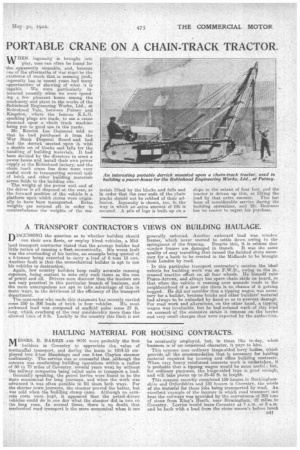A TRANSPORT CONTRACTOR'S VIEWS ON BUILDING HAULAGE.
Page 35

If you've noticed an error in this article please click here to report it so we can fix it.
D'USSING the question as to whether builders should run their own fleets, or employ hired vehicles, a Midland transport contractor stated that the average builder had little notion of running a fleet economically. His worst fault was the overloading of his lorries, an example being quoted of a 5-tonner being expected to carry a load of 6 tons 18 cwt. Another fault is that the unmechanieal builder is apt to ran his vehicles to destruction.
Again, few country bailders keep really accurate running expenses, being content to note only such items as the cost of petrol and oil. Drivers soon discover that the. masters are not very practical in this particular branch of business, and the more unscrapulous are apt to take advantage of this in many ways, to the detriment of the efficiency of the transport department.
The con teactor who made this statement. has recently carried some 250 to 390 loads of brick in four vehicles. Ffis most awkward load was composed of scaffold poles some 37 ft. -long, which overhung at the rear considerably more than the allowed limit of 8 ft. Luckily in the country this limit is not generally enforced. Another awkward load was 'window frames, which never seemed to settle down owing to the springiness of the framing. Despite this, it is seldom that window frames are damaged in transit. It was the same quality of easy travelling that caused the finished stone necessary for a bank to be erected in the Midlands to be brought from London by road.
In this particular transport contractor's opinion the ideal vehicle for building work was ab F.W.D., owing to the increased tractive effort, oss. all four wheels. He himself runs. Pierce-Arrows; and always has spare chain skids on board, so that when the vehicle is running over unmade roads in the neighbourhood of a new site there is no chance of it getting bogged. He did not. consider that a tipping wagon was necessary for a builder, because bricks and other builders' material had always to. be unloaded by hand so as to prevent damage. For road work and alterations, on the other hand, a tipping wagon was invaluable, but he had •refused werk -of this kind on account of the excessive strain it. imposes on the lorries and very small charges that were expected by the authorities.












































